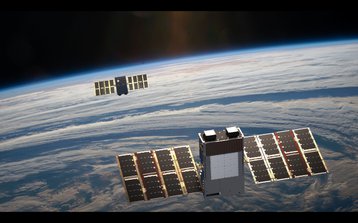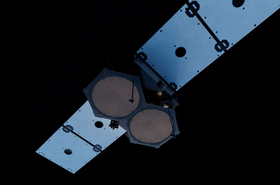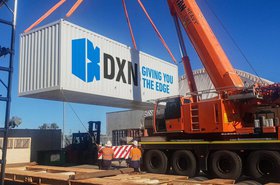Canadian satellite firm Kepler Communications has unveiled plans for on-orbit compute capacity through its optical inter-satellite links across its constellation the Kepler Network, and announced Axiom Space as a customer.
Kepler offers the lease or purchase of Edge computing hardware aboard its optical data relay satellite network supporting advanced processing, storage, cloud compute, multi-sensor data fusion, and other applications.
“Once the infrastructure for advanced computing exists in space, it is functionally limitless. Anything we use computing to process here on Earth can also be computed in an orbital environment,” Kepler Communications told DCD. “On-orbit computing can support virtually any mission case, [though] human space flight customers like Axiom [can] provide on-orbit data centers, governments can use it to create resiliency for sovereign data by hosting on-orbit, and Earth observation can employ AI/ML concepts to enable real-time tipping and cueing without humans in the loop.”
Axiom, one of a handful of commercial space station technology developers, has entered a strategic collaboration with Kepler, purchasing two on-orbit computing payloads supporting the company’s orbital data center (ODC) project, with the ODC nodes Axiom is developing set to fly on in Kepler’s network in the future.
“This collaboration with Axiom Space will accelerate the reality of on-orbit computing, enabling real-time decision making, enhanced mission autonomy, advanced imaging and AI/ML insights,” said Mina Mitry, chief executive officer and co-founder of Kepler Communications, in a statement.
Kepler’s first tranche of optical data relay satellites is scheduled to launch in the fourth quarter of 2025, including nine satellites and a spare in sun-synchronous orbit. The second tranche is expected to offer full global coverage across LEO about two years later as part of the European Space Agency’s High Throughput Optical Network (HydRON) program.
Optical Edge
Optical intersatellite links across The Kepler Network move data across the constellation faster than through conventional transmission, enabling faster downstream from one end of the network to the other.
According to Axiom, initial customers of these kinds of services include national security or civil and commercial Earth observation satellite operators using ODCs as an orbital vault for backing up their most sensitive and critical data.
“Additional industries that stand to benefit include and are not limited to telecommunications companies, IoT companies, transportation (airlines, shipping) with assets in disconnected environments, and institutions with a global footprint and a need for global digitally sovereign data management infrastructure like banks and healthcare companies,” Jason Aspiotis, global director of in-space data and security at Axiom Space told DCD.
Government funding for optical satellite links and other forward-facing space technologies such as the HydRON program were strategic, Kepler added.
“Space Communications are a critical infrastructure, yet they currently operate on decades-old technology. Programs investing in optical technology are looking to modernize their on-orbit communications to securely access large amounts of data in real time.”
Data centers in space
Axiom and Kepler will collaborate on extending orbital data center services to a number of key industries.
“As more ODC nodes get deployed and their costs come down, We are on a path to increase ODC capacity and capability from kilowatts to megawatts of cumulative processing power by the end of the decade,” Axiom’s Aspiotis said, “setting the foundations for gigawatts of capacity in the next couple of decades, which will provide customers with a viable long-term alternative to resource-intensive terrestrial data centers.”
In the next five years, Aspiotis speculated that hundreds or even thousands of satellites could be supported by in-space cloud services. He foresees in-space computing infrastructure and data center technologies becoming a cornerstone of off-world settlement “given the limitations of the speed of light."
Axiom is developing the world’s first commercial space station, with the first module targeting a launch 'no earlier than 2027'. It will initially be a part of the International Space Station, but is planned to separate and remain in orbit once the ISS is decommissioned. That module will contain an orbital data center.
Kepler Communications previously raised $92 million in a Series C funding round in 2023. Since 2016, the company has raised more than $200 million in equity, with funding from Costanoa Ventures, Canaan Partners, Tribe Capital, BDC Capital’s Industrial Innovation Venture Fund, and others. It closed a $60 million Series B round in 2021.
NTT has partnered with SKY Perfect JSAT to launch its own space data centers in 2025, while Blue Origin plans to deploy an in-space cloud computing service, and the EU is studying the concept of space data centers.
Storage-focused Lonestar Data Holdings has deployed data centers on the Moon - though the landers it has been aboard have suffered difficulties. It has also signed deals with Sidus Space for lunar data storage spacecraft.







